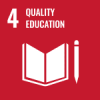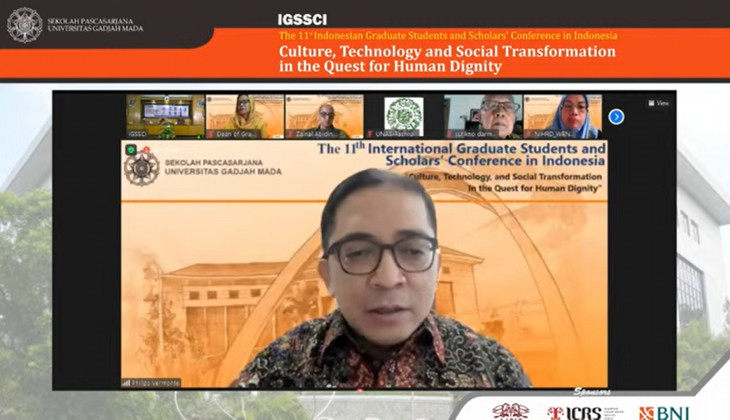UGM Graduate School organized The 11th International Graduate Students and Scholars’ Conference in Indonesia (IGSSCI) during 24-25 March 2021, raising the theme entitled Culture, Technology, Social Transformation in the Quest for Human Dignity.
“In line with the new paradigm as a World Class University, UGM Graduate School organized the annual IGSSCI as a medium publication for international students,” explained the Dean of UGM Graduate School, Prof. Siti Malkhamah on Wednesday (24/3).
She then revealed the goal of these activities is for academicians, researchers, Graduate School practitioners to share knowledge and information in the field of social and technical sciences widely.
The Head of the IGSSCI Organizing Committee, Dr. Dicky Sofjan revealed 150 abstracts were submitted in the IGSSCI. There were also a hundred speakers from seven countries. On the first day, Philips Vermonte, as a Central Executive Director for Strategic and International Studies (CSIS), started the discussion entitled “Covid-19 and Us: The Changes in our Culture, Technology, and Society in the Time of Pandemic and Beyond”. This topic revealed that pandemic was inevitable for all of us. He appraised that there were two ironies learned from this condition. First, the Covid-19 can spread more quickly because the world we live in today is more connected than ever, mainly due to transportation technology that has changed a lot in the last few decades.
“People can easily move from one place to another, which was considered beneficial before the pandemic. In the current condition, our unlimited mobility could become a significant enabling factor in the virus transmission,” he said.
The covid pandemic has made some people re-think the relevance between the government system and its agility in handling pandemic. There is an assumption that stated the democratic state is more effective in handling pandemic inherently. A state with a democratic system is a service, responsive, protective-oriented to its citizens. Otherwise, solving the pandemic will be a huge challenge for some non-democratic countries.
“However, non-democratic countries had challenged this old assumption. Based on the indicator performance of countries in the last 12 months, surprisingly, they can also overcome pandemic effectively,” he added.
After the opening session, there was also an IGSSCI plenary meeting that discussed “Heartware, Culture, and Ecological Crisis” by three speakers: Dr. Maharani Hapsari from Universitas Gadjah Mada, Assoc. Professor Zeeda Muhammad from the University of Malaya, and Dr. Fackhruddin Majeri Mangunjaya from the National University, followed by two parallel sessions and a second plenary session.
Source: https://ugm.ac.id/id/berita/20905-sekolah-pascasarjana-ugm-gelar-igssci-ke-11



